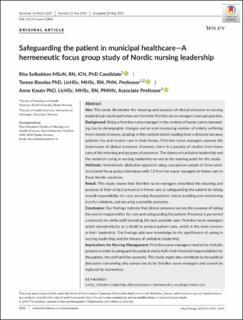Safeguarding the patient in municipal healthcare- a hermeneutic focus group study of Nordic nursing leadership
Peer reviewed, Journal article
Published version
Permanent lenke
https://hdl.handle.net/11250/2654630Utgivelsesdato
2019-05Metadata
Vis full innførselSamlinger
Originalversjon
Solbakken, R., Bondås, T., Kasén, A. (2019) Safeguarding the patient in municipal healthcare- a hermeneutic focus group study of Nordic nursing leadership. Journal of Nursing Management, 27(6), 1242-1250 10.1111/jonm.12806Sammendrag
Aim
This study illuminates the meaning and purpose of clinical presence in nursing leadership in municipal home care from the first‐line nurse manager's own perspective.
Background
Being a first‐line nurse manager in the context of home care is demanding due to demographic changes and an ever‐increasing number of elderly suffering from chronic diseases. Leading in this context entails leading from a distance because patients live and receive care in their homes. First‐line nurse managers express the importance of clinical presence. However, there is a paucity of studies from home care of the meaning and purpose of presence. The theory of caritative leadership and the model of caring in nursing leadership served as the starting point for this study.
Methods
Hermeneutic abductive approach using a purposive sample of three semistructured focus group interviews with 11 first‐line nurse managers in home care in three Nordic countries.
Result
This study shows that first‐line nurse managers described the meaning and purpose of their clinical presence in home care as safeguarding the patient by taking overall responsibility for care, securing the patients' voices, building and maintaining trustful relations, and securing a sensible economy.
Conclusion
Our findings indicate that clinical presence serves the purpose of taking the overall responsibility for care and safeguarding the patient. Presence is perceived a necessity to verify staff providing the best possible care. First‐line nurse managers acted metaphorically as a shield to protect patient care, which is the main concern in their leadership. The findings add new knowledge to the significance of caring in nursing leadership and the theory of caritative leadership.
Implications for Nursing Management
First‐line nurse managers need to be clinically present in order to safeguard the patient and to fulfil their threefold responsibilities for the patient, the staff and the economy. This study might also contribute to the political discussion concerning why nurses has to be first‐line nurse managers and cannot be replaced by economists.

